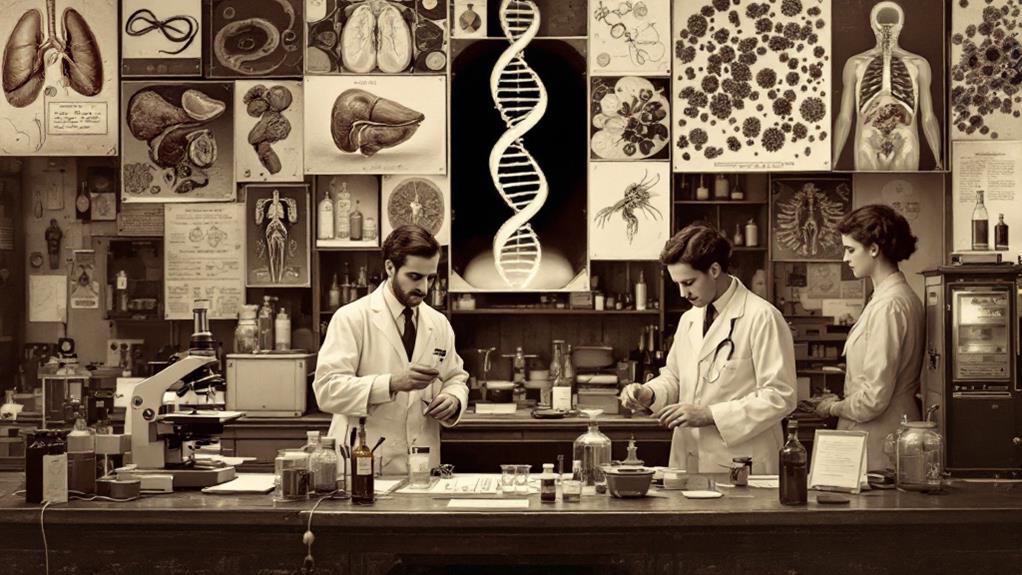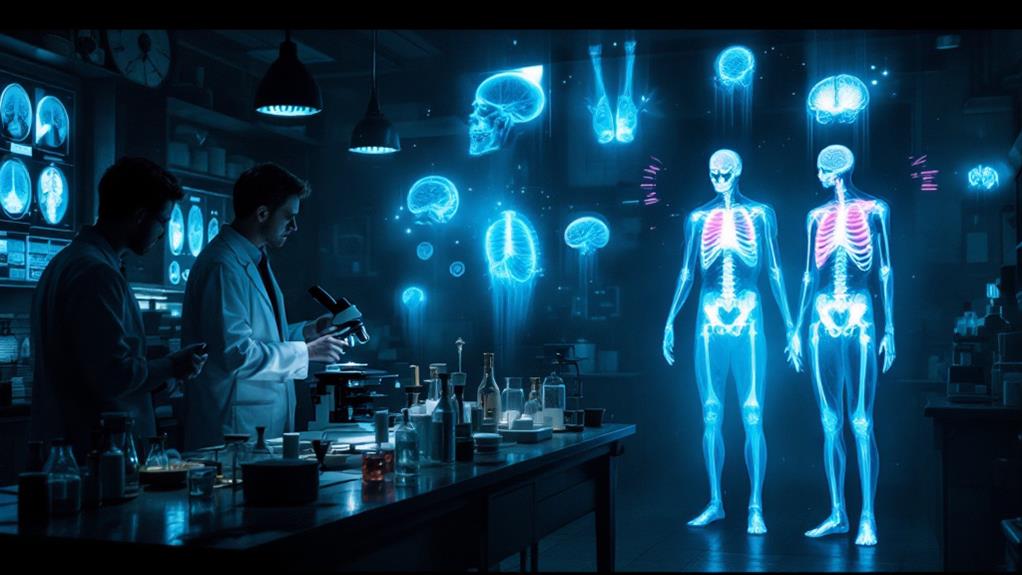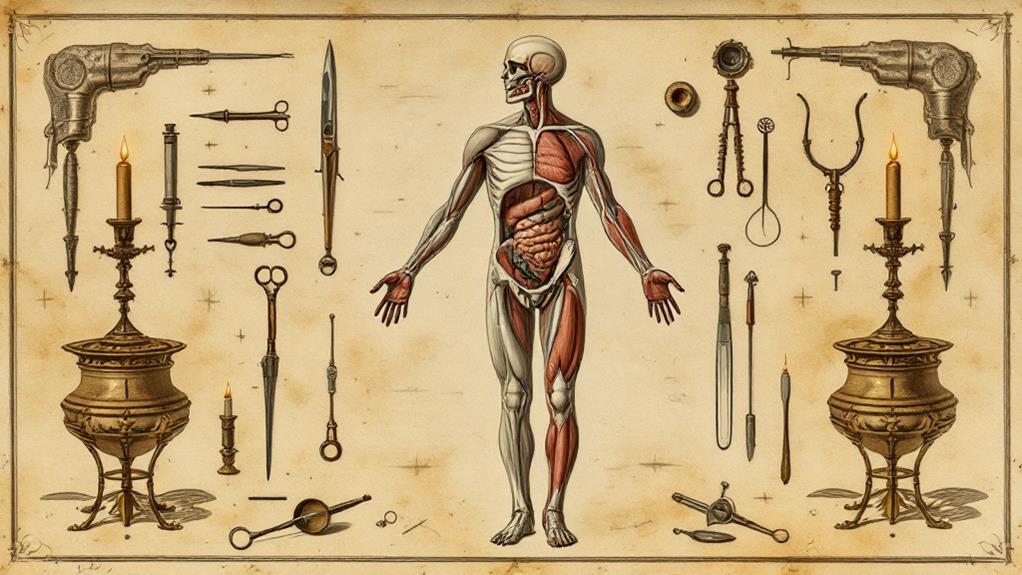The History of Immunology: How We Learned to Fight Disease
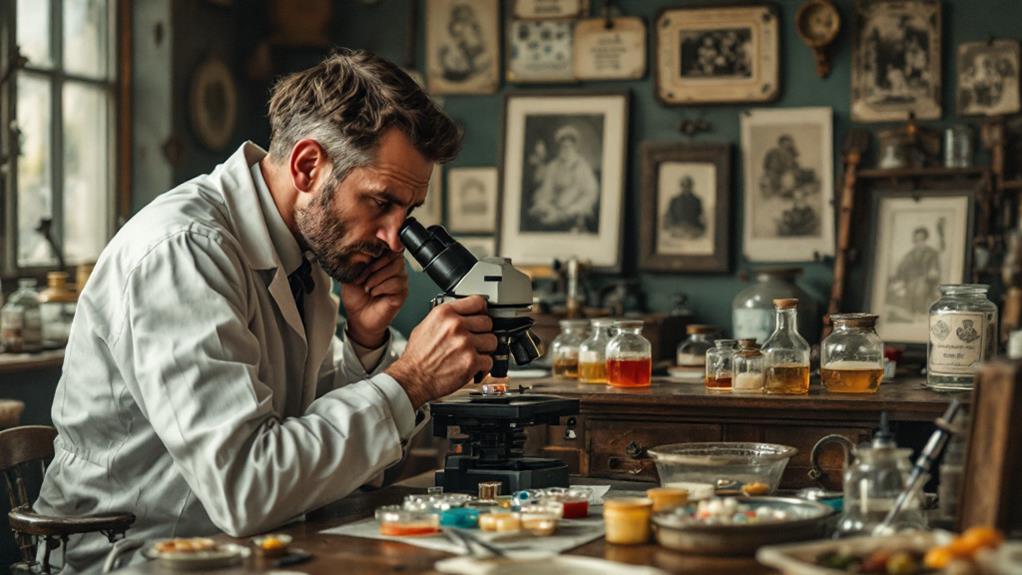
You'll investigate a captivating voyage through time as you traverse the history of immunology. From ancient observations of disease immunity to early vaccination attempts like variolation, humanity's understanding of our body's defenses has evolved dramatically. The development of germ theory and the discovery of antibodies revolutionized medical science. Cellular immunity discoveries, including the role of T cells and the major histocompatibility complex, further expanded our knowledge. Today, modern breakthroughs in immunotherapy, vaccine technology, and personalized medicine continue to shape how we combat diseases. This extraordinary progression has reformed our ability to combat illness and protect global health.
Ancient Observations of Immunity
Throughout history, people noticed that survivors of certain diseases rarely got sick from the same illness again. This observation wasn't limited to one culture or region; it was a piece of cross-cultural knowledge that spanned continents and centuries.
In ancient China, you'd find records of smallpox survivors being recruited to care for the sick, as they were believed to be protected. Greek historian Thucydides noted in 430 BCE that those who survived the plague in Athens could safely nurse the ill without fear of reinfection. These early perceptions hinted at the existence of acquired immunity, though the mechanisms remained a mystery.
While our ancestors didn't understand the complexities of the immune system, they recognized the body's innate defense mechanisms. They observed that wounds would become inflamed and produce pus, which we now know is part of the body's natural response to infection. Traditional medicines across cultures often aimed to support these processes, even if they didn't fully grasp how they worked.
These ancient observations laid the groundwork for the scientific study of immunology, setting the stage for future breakthroughs in understanding and utilizing our body's defenses against disease.
Variolation and Early Vaccination
Building on ancient observations, the practice of variolation emerged as an early attempt to prevent smallpox. You'd find this technique being used in various parts of the world, including China, India, and the Ottoman Empire. It involved deliberately inoculating healthy individuals with material from smallpox lesions, aiming to induce a mild case of the disease and subsequent immunity.
While variolation offered some protection, it wasn't without risks. You could still contract a severe case of smallpox or unintentionally spread the disease to others. These smallpox transmission risks led to the search for safer alternatives.
Enter Edward Jenner, an English physician who noticed that milkmaids exposed to cowpox seemed immune to smallpox. In 1796, he conducted his famous experiment, inoculating a young boy with cowpox material and later exposing him to smallpox. The boy remained healthy, demonstrating the effectiveness of cowpox immunization.
Jenner's trailblazing work laid the foundation for modern vaccination. You'd soon see his method, which he termed "vaccination," disseminate rapidly across Europe and beyond. This marked a seminal moment in immunology, facilitating future advancements in disease prevention.
Germ Theory and Antibodies
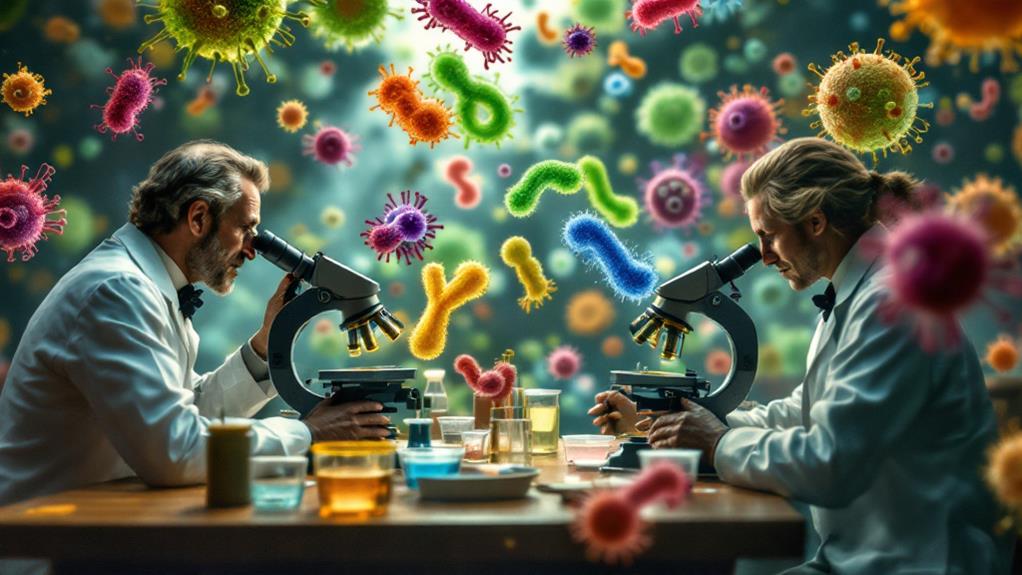
Innovative findings in the late 19th century revolutionized our understanding of disease. Louis Pasteur's germ theory proposed that microorganisms cause infections, challenging the prevailing miasma theory. This breakthrough led to the development of aseptic techniques and sterilization methods, considerably reducing mortality rates in hospitals.
Robert Koch's work on identifying specific pathogens responsible for diseases like anthrax and tuberculosis further solidified germ theory. These discoveries paved the way for targeted treatments and preventive measures.
As scientists explored the immune system, they uncovered the role of antibodies. Paul Ehrlich's side-chain theory suggested that cells produce specific receptors to neutralize toxins, laying the groundwork for our understanding of pathogen recognition. Élie Metchnikoff's discovery of phagocytes introduced the concept of cellular immunity, complementing the humoral immunity described by antibodies.
The complement system, a group of proteins that enhance the body's ability to clear pathogens, was identified during this period. This complex cascade of reactions highlighted the intricate nature of immune responses and opened new avenues for research into immunological disorders and potential therapies.
Cellular Immunity Discoveries
Major breakthroughs in cellular immunity emerged from out of the shadows of antibody research. While scientists had long focused on humoral immunity, the role of cells in fighting disease remained a mystery. It wasn't until the mid-20th century that researchers began to unravel the intricacies of cellular immunity.
You'll find that the expedition to understanding cellular immunity involved several key revelations:
- Identification of lymphocytes as the primary cells responsible for immune responses
- Recognition of T cells as distinct from B cells
- Discovery of T cell function in coordinating immune responses
- Elucidation of the major histocompatibility complex (MHC) and its role in antigen presentation
These findings revolutionized our understanding of the immune system. Scientists realized that T cells play an indispensable role in orchestrating immune responses, working alongside antibodies to defend the body against pathogens. The discovery of T cell subsets, such as helper and cytotoxic T cells, further illuminated the elaborate mechanisms of cellular immunity. This knowledge has since paved the way for pioneering therapies, including cancer immunotherapies and treatments for autoimmune diseases.
Modern Immunological Breakthroughs

Recent decades have witnessed a surge of innovative findings in immunology. You've likely heard about groundbreaking immunotherapy approaches that utilize the body's own defenses to combat cancer. These treatments, like CAR T-cell therapy, have revolutionized cancer care, offering hope to patients with previously untreatable conditions.
Vaccine development strategies have also evolved dramatically. You're now benefiting from new technologies like mRNA vaccines, which proved indispensable during the COVID-19 pandemic. These advances allow for rapid vaccine creation and deployment against emerging threats.
Scientists have deepened our understanding of autoimmune diseases, leading to targeted therapies that modulate specific immune responses. You might know someone who's benefited from biologics for conditions like rheumatoid arthritis or psoriasis.
The microbiome's role in immunity has become a hot topic. You've probably seen probiotics marketed for immune health, reflecting our growing knowledge of how gut bacteria influence our defenses.
Lastly, advances in immunogenetics have paved the way for personalized medicine. Your unique genetic profile can now inform treatment decisions, ensuring you receive the most effective interventions for your individual immune system.
